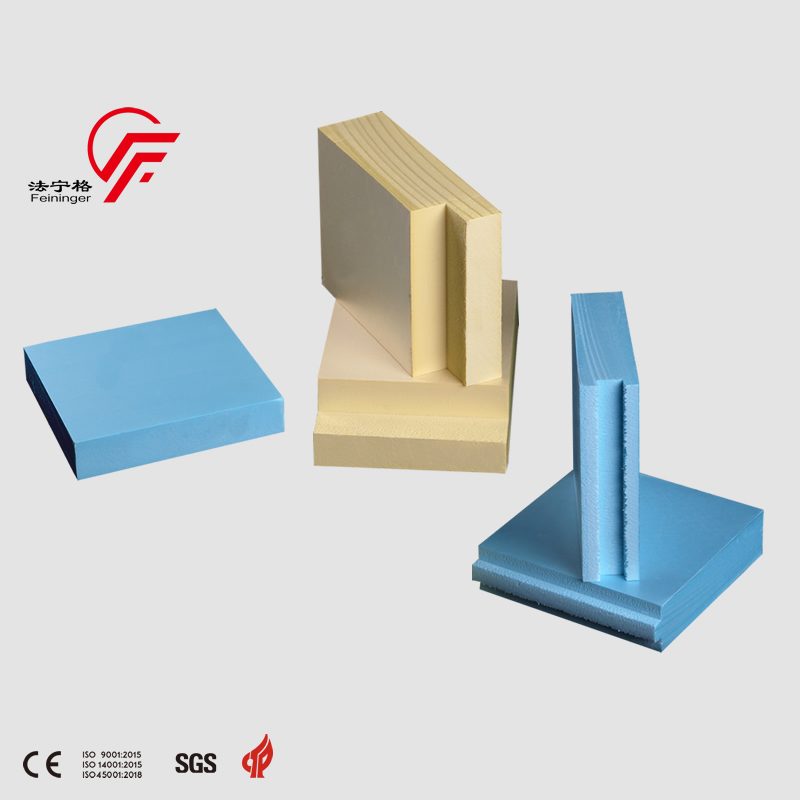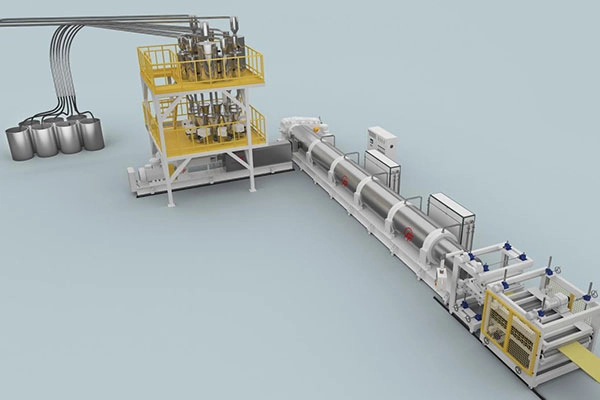Understanding how XPS foam density impacts material performance can help in selecting the right foam for specific applications. In this article, we will explore the relationship between XPS foam density and its core performance attributes, including compressive strength, thermal conductivity, and application suitability.
What is XPS Foam?
XPS foam is a rigid insulation material made from polystyrene, produced through an extrusion process that creates a closed-cell structure. This structure gives XPS foam its superior thermal insulation capabilities and high compressive strength. Additionally, the closed-cell design provides water resistance, making XPS foam suitable for use in moisture-prone environments. Its widespread application includes wall insulation, roofing, foundation insulation, and various industrial uses.

Basic Properties of XPS Foam
XPS foam is prized for its high strength and resistance to compression, making it a preferred material in both construction and industrial applications. These qualities are a result of its dense closed-cell structure formed during manufacturing, which allows the material to withstand significant loads without deforming.
Furthermore, XPS foam is known for its low thermal conductivity, making it an excellent insulator that helps reduce energy consumption in buildings. Its resistance to water absorption also protects structures from moisture damage, further enhancing its versatility.
Why Density is a Key Factor in XPS Foam Performance
XPS foam density is one of the most crucial aspects that influence its performance. Density affects several key properties, including compressive strength, thermal conductivity, and overall material stability. A higher density typically leads to improved strength and stability, while lower density may enhance certain insulation properties. Therefore, selecting the appropriate density is essential to ensuring optimal performance for the intended application.
The Impact of XPS Foam Density on Performance
1. Density and Compressive Strength
One of the primary factors influenced by XPS foam density is its compressive strength. The density of XPS foam generally ranges from 30 to 45 kg/m³, with higher densities offering greater compressive strength. This makes high-density XPS foam ideal for load-bearing applications, such as under concrete slabs, where the foam needs to support heavy loads without collapsing.
2. Density and Thermal Conductivity
Thermal conductivity, a measure of how well a material insulates against heat transfer, is another important factor impacted by XPS foam density. Generally, lower-density XPS foam has higher thermal conductivity, meaning it allows more heat to pass through, which reduces its insulation effectiveness. Conversely, higher-density XPS foam has a denser structure, which limits heat transfer and improves insulation performance. This makes high-density XPS foam ideal for applications where maximum thermal insulation is required, such as in cold storage facilities or insulated walls.
Key Insight:
Higher density = better insulation performance
Lower density = increased thermal conductivity
3. Density and Application Suitability
The suitability of XPS foam for different applications is closely tied to its density. For example, low-density XPS foam (around 33 kg/m³) is often used in lightweight applications, such as drones or model airplane wings, where weight savings are essential.
In contrast, high-density XPS foam is better suited for applications requiring significant strength and stability, such as foundation insulation or roofing, where the material needs to withstand heavy loads and environmental exposure.
Density | Applications | Key Advantages |
Low Density | Drones, model airplane wings | Lightweight, easy to shape |
High Density | Foundation insulation, roofing, cold storage walls | Strong, stable, excellent load-bearing capacity |
4. Production Technology's Effect on Density
The production technology used in manufacturing XPS foam plays a crucial role in determining its density and overall performance. For example, CO2 foaming technology is commonly employed to produce XPS foam with densities between 30 and 45 kg/m³. This technology ensures a consistent closed-cell structure, which enhances the foam's compressive strength and stability. Manufacturers like Feininger use advanced production techniques to control foam density, resulting in high-quality XPS foam products tailored for various applications.

Examples of XPS Foam Applications
1. Cold Storage Facilities
Cold storage facilities rely on high-quality insulation materials to maintain low temperatures and reduce energy consumption. XPS foam is an ideal material for cold storage due to its excellent insulation properties and resistance to moisture. The density of the XPS foam used in cold storage must be carefully selected to ensure optimal thermal insulation and structural support. Typically, higher-density XPS foam is preferred in cold storage applications to maximize insulation efficiency and ensure long-term performance.
2. Insulation for Interior and Exterior Walls
XPS foam is a popular choice for insulating both interior and exterior walls in residential and commercial buildings. In wall insulation, factors such as thermal performance, moisture resistance, and ease of installation are critical. Higher-density XPS foam is often used in exterior wall applications, where additional strength and moisture resistance are necessary, while lower-density foam can be sufficient for interior walls where load-bearing capacity is less of a concern.
3. Foundation Insulation
Foundation insulation is critical for preventing heat loss in buildings and protecting against ground moisture. XPS foam's closed-cell structure and high compressive strength make it an excellent choice for foundation insulation. In this application, the foam's density must be carefully selected to provide the necessary load-bearing capacity while maintaining insulation efficiency. High-density XPS foam is typically used for foundation insulation to ensure long-lasting performance and resistance to moisture infiltration.
4. Roof Insulation
Roof insulation is another essential application for XPS foam, especially in flat or low-slope roofing systems where the material is exposed to significant weight and environmental factors. High-density XPS foam is typically used in these applications to provide the necessary strength and durability. Additionally, the material's moisture resistance helps protect the roofing system from water damage, making it a reliable choice for long-term roof insulation.
Conclusion
XPS foam density plays a critical role in determining the material's performance across various applications. Higher-density foam generally offers better compressive strength and stability, making it ideal for load-bearing and high-traffic areas. However, there is often a trade-off in thermal insulation performance. Lower-density foam may provide better insulation in some cases but may lack the structural strength needed for more demanding applications. By understanding the relationship between XPS foam density and material performance, you can make informed decisions when selecting the right insulation and structural materials for your projects.
Where to Buy High-Quality XPS Foam
If you're looking for top-quality XPS foam, Feininger is a trusted manufacturer known for its advanced production techniques and reliable products. To explore their offerings and find the perfect XPS foam for your needs, visit Feininger's website.

 Español
Español Pусский
Pусский
